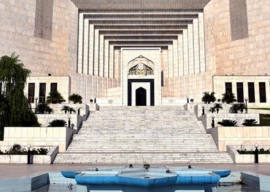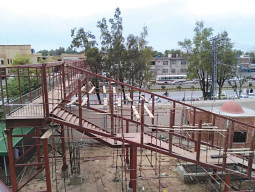
In the landmark judgment, a three-member larger bench of the Islamabad High Court (IHC), comprising Justice Athar Minallah, Justice Aamer Farooq and Justice Mohsin Akhtar Kayani, has allowed all the petitions challenging the construction of different buildings in Bani Gala and Sector E-11.
The petitions had asserted that high-rise buildings and other buildings of a commercial nature cannot be built in Bani Gala or in the unacquired areas of Sector E-11.
The bench divided the petitions into category-A (Bani Gala) and category-B (Sector E-11).
One of the petitioners in category A contended that a respondent had started work on a high-rise building near the Kurang Road in Bani Gala without obtaining the requisite approval from the Capital Development Authority (CDA).
Another petitioner in Category-B told the court that the respondents have either built or are in the process of starting construction work of different buildings in Sector E-11, however, most of the proposed buildings are of a commercial nature.
“We allow these petitions and declare that construction of houses or buildings of any nature, whether in the Golra Revenue Estate (Sector E-11) or the area comprising Bani Gala which have been or are intended to be constructed in violation of the master plan, the Ordinance of 1960, the Zoning Regulations of 1992, the Ordinance of 1966 and the Wildlife Ordinance of 1979, as the case may be, are illegal, without lawful authority and jurisdiction and thus liable to be demolished as mandated under the Ordinance of 1960 and the regulations made thereunder,” the bench held in the judgment.
Bani Gala properties: SC seeks complete lease record of land around Rawal Lake
Moreover, it noted that none of the respondents has been able to place on record any document which would establish the legality of their building.
Justice Minallah, who authored the judgment, said that the CDA is the sole and exclusive regulator of buildings constructed in the capital and that union council are not vested with the authority to grant any approval contrary to or in violation of the Ordinance of 1960 and other regulations.
“We also declare that in case of any violation the chairman and each Member of the authority (CDA) shall be jointly and severally liable for breach of duties and obligations imposed under the Ordinance of 1960,” the judgment read, adding that the Islamabad’s Chief Commissioner shall also be equally responsible if the legal framework in the un-acquired areas is violated.
Federal govt to constitute commission
Keeping in view the imminent danger and risk in the context of environmental degradation and climatic change, the larger bench has observed that it has become inevitable to review the existing Master Plan and assess its efficacy.
Subsequently, the court has direct the federal government to forthwith take steps of constituting a commission comprising professional experts — preferably of international repute — in the field of town planning, environmental management and finance.
This commission, the judgment said, shall make recommendations to the federal government and the federal government is expected to complete the proceedings within six months.
Moreover, the chief commissioner has been directed to aid and assist the CDA in ensuring that no building or house is built in any area of Islamabad.
“No illegal building or construction shall be regularised unless the federal government certifies,” the order read, adding that pursuant to recommendations made by the commission, it shall not in any manner adversely affect the environment or have adverse effects relating to climate change.
The court has further directed the federal government to forthwith take steps to make the Environmental Tribunals functional, preferably within 90 days from the date receiving a certified copy of this judgment.
Published in The Express Tribune, July 10th, 2018.


1727778647-0/diddy-(16)1727778647-0-165x106.webp)

1732014631-0/BeFunky-collage-(71)1732014631-0-165x106.webp)
1732012115-0/Untitled-design-(14)1732012115-0-270x192.webp)
1732002687-0/Untitled-design-(11)1732002687-0-270x192.webp)










COMMENTS
Comments are moderated and generally will be posted if they are on-topic and not abusive.
For more information, please see our Comments FAQ